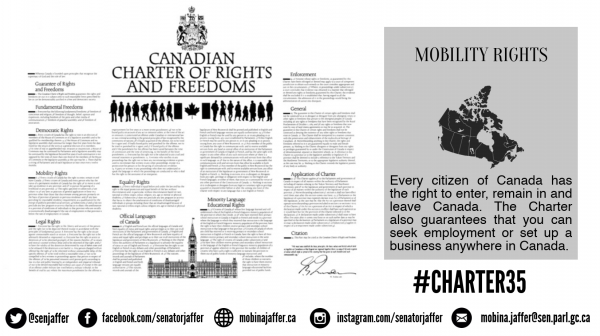
In my last blog, I outlined how the mobility rights from section 6 of the Canadian Charter of Rights and Freedoms allow Canadians to both move and pursue opportunities anywhere they like- regardless of where they came from or where they are going.
However, these rights have their limitations. In fact, Section 6 is particularly special among the Charter rights, since its limitations are found within the text of the right itself! In today’s blog, I will examine how sections 6(3) and 6(4) of the Charter both limit section 6(2)’s right to take up residence or gain a livelihood in any province.
(3) The rights specified in subsection (2) are subject to
a) any laws or practices of general application in force in a province other than those that discriminate among persons primarily on the basis of province of present or previous residence; and
b) any laws providing for reasonable residency requirements as a qualification for the receipt of publicly provided social services.
(4) Subsections (2) and (3) do not preclude any law, program or activity that has as its object the amelioration in a province of conditions of individuals in that province who are socially or economically disadvantaged if the rate of employment in that province is below the rate of employment in Canada.
While it may seem odd that Section 6’s limitations are written into the right itself, the history behind the Charter’s drafting provides important context to each one:
For example, at the time of the Charter’s drafting, Premier Premier René Lévesque of Quebec argued that mobility rights would allow too many Anglophones to come into Quebec, which in turn would give Quebecers little reason to learn the French language!
To address this concern, section 6(3)(a) – which allows provinces to keep laws that restrict mobility, so long as they do not discriminate based on province of past or present residence- was added into the Charter. With this section, Quebec can create laws that create barriers to jobs based on language, since they are unrelated to a person’s province of past or present residence.
At the same time, the premiers of Canada’s richer provinces- and particularly Premier Lougheed of Alberta- were concerned that mobility rights would make people abandon poorer provinces and go to richer ones to exploit the advanced welfare and health benefits found there.
To deal with these concerns, Section 6(3)(b), which allows provinces to set down residency requirements for social services was added to the Charter! With this section, such laws could act as a deterrent for people who were moving for the sole purpose of exploiting social services.
Finally, at the time of the Charter’s signing, Newfoundland’s economy was doing significantly worse than the rest of the country, but had also found a rich oil deposit that could turn around its fortunes! To ensure that the wealth created by these oil deposits would stay in Newfoundland, Premier Peckford insisted that the Charter must him to provide long-time residents of the province with a better opportunity to find work than newcomers.
As a result, Section 6(4) allows for violations of Section 6(2) in provinces where unemployment is worse than the rest of the country!
While each of the limitations severely limits the right to take residence in any province and gain a livelihood there, they were each included for a very important reason. If they were not included, the Charter may never have been signed at all!
Please look forward to next week’s blog, where I will conclude my look at the limitations on the mobility rights by examining how Section 6 is limited by Section 1- the reasonable limits clause.